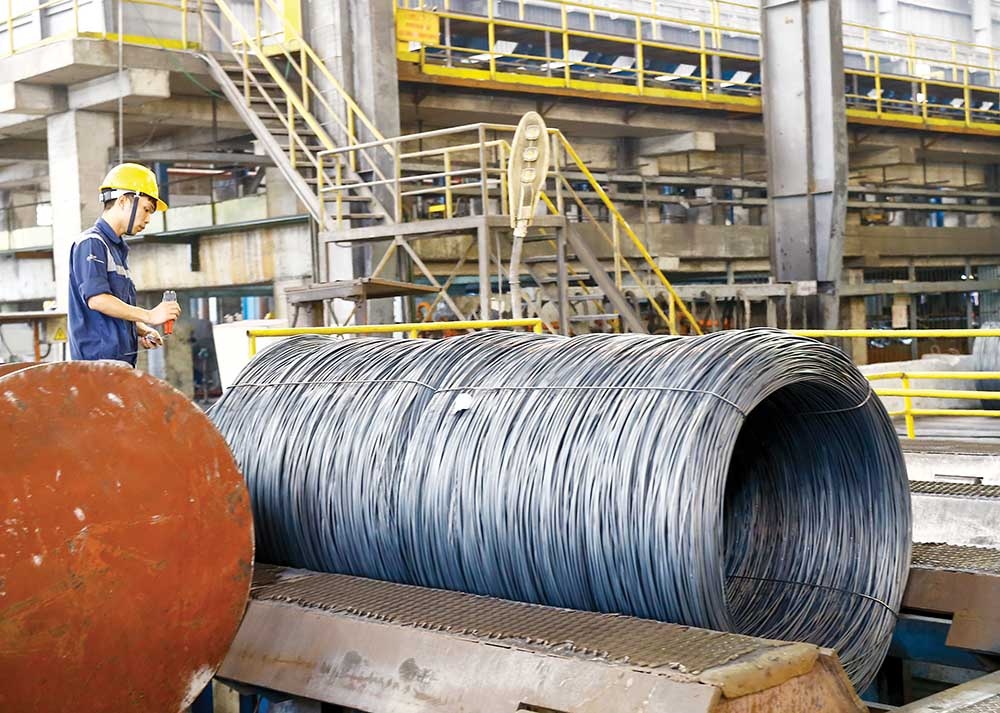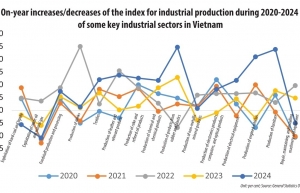Sustaining growth in a volatile global environment
The US-China trade war is expected to intensify, as the US recently announced an additional 10 per cent tariff, bringing the total to 20 per cent, on goods imported from China from early March, in addition to a 25 per cent tariff on goods from Mexico and Canada.
 |
| Firms need to take flexible measures amid growing trade tensions globally. Photo: baodautu.vn |
This casts significant impacts on countries around the world, including Vietnam, especially regarding import-export business.
Nguyen Kim Thanh, CEO of Sa Ky Foods JSC- a big seafood exporter in Mekong delta region, opined that the US decision to raise import tariffs on China, Canada, and Mexico, along with the risk of a global trade war, could present both challenges and opportunities for Vietnam’s export businesses.
From a positive perspective, when Chinese products become more expensive due to higher tariffs, US importers would look for alternative suppliers, with Vietnam being a potential choice.
Specifically, for the seafood industry, if China faces higher tariffs, Vietnamese companies, including Sa Ky Foods, could bolster exports of tra fish, tilapia, tuna, shrimp, and other seafood items to the US.
“If we proactively approach US importers who are seeking new sources, we could secure significant contracts from this market. For Sa Ky Foods, since the end of last year, we have received many orders from US partners for the first and second quarters of 2025. Our target for the US market this year is to grow by 40-60 per cent. Additionally, we continue to effectively avail of advantages from trade agreements like Comprehensive and Progressive Agreement for Trans-Pacific Partnership and EVFTA to increase our market share in the US,” Thanh said.
According to experts, not only Vietnam but also India, Indonesia, and Thailand will seize this opportunity to boost exports to the US. Therefore, if businesses couldn’t offer competitive prices or produce items on par with US standards, they could lose market share to their competitors.
Hoang Danh Huu, founder and CEO of Ede Farm Trade Service Co., Ltd. (Miss Ede), a coffee business in Vietnam’s Central Highlands region, said that the risks of tariffs and trade tensions were high.
“Additionally, the constant increase in raw coffee prices over a long time would cause more volatility in exports in 2025, especially for agricultural products and coffee to key markets such as the US and the EU,” said Huu.
Thai Anh Tuan, CEO of Simexco Daklak, said that the US was one of the company’s key markets, and the company was monitoring information and preparing as best as possible for any disadvantages.
“We are confident in meeting the strict requirements of the challenging market by working with 45,000 farmers and leveraging more than 50,000 hectares of sustainably developed growing areas. In light of global volatility forecasts, aside from the EU and the US, this year we aim to increase exports in other markets to reduce risks from dependence on key markets,” Tuan said.
In addition to continued market focus, technology investment solutions execution, and production cost optimisation to reduce prices and increase profits, most businesses choose to diversify their markets and adopt the strategy of “not putting all their eggs in one basket” to avoid risks from import markets.
Like-minded Sa Ky Food executive Nguyen Kim Thanh assumes that if the US tightens imports, local businesses can boost sales to other markets such as Canada, Japan, and the EU, thanks to preferential tariffs.
Firms can also take advantage of the Vietnam-EU Free Trade Agreement to source raw materials from the EU to reduce production costs.
Additionally, since Vietnam has a bilateral trade agreement with the US, businesses will optimise their HS Codes- internationally standardised classification codes used in global trade to categorise products and determine applicable tariffs and trade regulations, to reduce import taxes and increase competitiveness.
However, as the trade war continues to escalate, especially between major powers like the US and China, or among large economic blocs, most businesses predict that Vietnam’s exports could be significantly affected.
In such a case, the role of the government becomes crucial in helping firms overcome challenges and seize opportunities.
“Firms expect the government support such as through reducing import taxes on raw materials, waiving export taxes on some strategic products, giving preferential loans for production investment, lowering logistics costs, developing direct transportation routes between Vietnam and the US, and joining new FTAs for market expansion,” Thanh said.
 | Sustaining growth in coffee amid global shifts Global coffee markets are entering a pivotal phase, shaped by fluctuating prices, climate challenges, and evolving regulations. As Vietnam navigates these dynamics, Laleska Rossi Moda, analyst at Hedgepoint Global Markets, spoke with VIR’s Khanh Linh about its ability to sustain competitiveness and drive growth. |
 | Production serving as a crucial driver for growth Domestic industrial production has continued its recovery, reflecting the government’s effective pro-business policies and its efforts to generate more employment. |
 | Global economy set for moderate growth in 2025 amid rising geopolitical risks The global economy is expected to maintain moderate growth in 2025, but significant uncertainty looms, particularly regarding political and geopolitical developments. |
What the stars mean:
★ Poor ★ ★ Promising ★★★ Good ★★★★ Very good ★★★★★ Exceptional
Related Contents
Latest News
More News
- State corporations poised to drive 2026 growth (February 03, 2026 | 13:58)
- Why high-tech talent will define Vietnam’s growth (February 02, 2026 | 10:47)
- FMCG resilience amid varying storms (February 02, 2026 | 10:00)
- Customs reforms strengthen business confidence, support trade growth (February 01, 2026 | 08:20)
- Vietnam and US to launch sixth trade negotiation round (January 30, 2026 | 15:19)
- Digital publishing emerges as key growth driver in Vietnam (January 30, 2026 | 10:59)
- EVN signs key contract for Tri An hydropower expansion (January 30, 2026 | 10:57)
- Vietnam to lead trade growth in ASEAN (January 29, 2026 | 15:08)
- Carlsberg Vietnam delivers Lunar New Year support in central region (January 28, 2026 | 17:19)
- TikTok penalised $35,000 in Vietnam for consumer protection violations (January 28, 2026 | 17:15)

 Tag:
Tag:


























 Mobile Version
Mobile Version